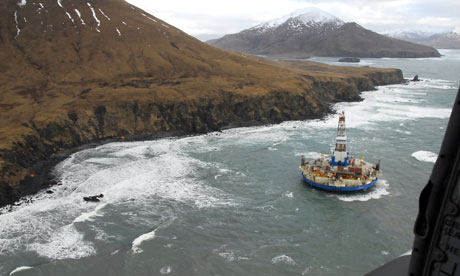Stricken Shell oil vessel towed away after being successfully refloated
Tug boats tow 28-tonne Kulluk to nearby Kiliuda Bay where the damage can be assessed after grounding on Alaskan coast

The Kulluk aground ran aground on Sitkalidak Island after breaking its heavy towing lines in storm-force winds on its way for maintenance in Seattle. Photograph: Ho/AFP/Getty Images
The stricken Shell oil vessel that ran aground near an uninhabited Alaskan island on new year's eve has been refloated and is being towed to a sheltered cove where the damage can be assessed.
The 28,000-tonne Kulluk now appears to be heading at 3.5km an hour on its way to Kiliuda Bay, about 40 miles from where it ran aground on Sitkalidak Island, according to the website marinetraffic.com. It is understood that is being towed at night by the Seattle-based tug Aiviq, with seven other ships in attendance.
The Kulluk is reportedly carrying more than 140,000 gallons (530,000 litres) of diesel. The Arctic-class vessel, which has no engines of its own, broke its heavy towing lines in storm-force winds on its way for maintenance in Seattle.
"Following this initial step forward [of refloating], we will continue to remain cautious while we assess the Kulluk's condition," said Martin Padilla, incident commander. "We will not move forward to the next phase until we are confident that we can safely transport the vessel," said the latest communication from the taskforce coordinating the rescue.
The physical damage done to the vessel is thought to be small compared to the reputational damage suffered by the company. Shell is investing $4.5bn to start drilling in the harsh, environmentally sensitive Chukchi and Beaufort seas off Alaska, but has suffered a series of mishaps. An engine caught fire in the Kulluk's sister ship, Noble Discoverer, and the company has been cited by federal authorities for illegal fluid dischargesfrom a containment vessel.
The company has admitted that it cannot meet US government air pollution targets for its Arctic drilling fleet and had to abandon drilling for oil in the Arctic in September. Its original plan had been to drill five Arctic wells in 2012. Some drilling had to be halted abruptly after it emerged that an ice floe 30-miles long and 12-miles wide appeared to be heading towards the drill ship.
Environment groups claimed the incident underlined the dangers of trying open up the Arctic to oil drilling. "It's one accident after another. The longer this goes on the greater the erosion of Shell's credibility," said Greenpeace Arctic oil campaigner Ben Ayliffe in London. "The Kulluk was thankfully grounded close to a coastguard station. We should not assume a response anywhere else in the Arctic would be like this. Investors will be watching this latest mishap and asking how much longer Shell can persevere with a multibillion dollar Arctic drilling programme that has been characterised by one glaring operational blunder after another."
No hay comentarios:
Publicar un comentario